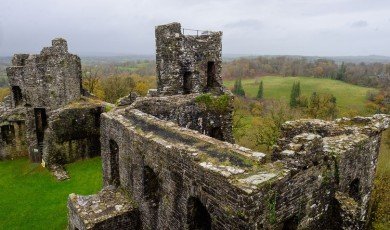
Wales, with its rugged mountains, pristine rivers, and winding countryside roads, has fast become a premier destination for adventurers seeking climbing, biking, and rafting experiences. From the soaring peaks of Snowdonia to the rushing rapids of the River Tryweryn, the region offers nature masterpieces that attract thrill-seekers from across the globe. As a local enthusiast or an event organizer, you might be intimately familiar with these hidden gems and the latest news from the region — perhaps you are even planning your next yard sale or organizing guided tours. But are your adventures and outdoor events ready to welcome international travelers, especially German-speaking tourists? In today's interconnected world, the demand for German language translation services is rapidly rising — and for good reason.
This blog post explores the crucial role of German translation within guided adventure tours in Wales, illustrating how accessing the German-speaking market can enhance your tourism business, enrich visitor experiences, and keep your region firmly on the travel radar. Read on to discover best practices, real benefits, and actionable tips to future-proof your operations.
Main Research: Why German Translation Matters in Wales’ Adventure Market
The Growing Popularity of Wales Among German Travelers
Tourism statistics indicate Germany as one of the largest inbound travel markets for the UK, with nearly three million Germans visiting annually prior to 2020. Many of these tourists flock to Wales, drawn by its spectacular natural landscapes, unique adventure opportunities, and vibrant local culture. Trends show that guided activities such as climbing, biking, and rafting top the list of preferred experiences among younger German adventurers and active families.
However, even the most beautiful traveling routes or well-promoted events risk being overlooked without clear, accessible information in the traveler’s native tongue. Potential visitors often seek confidence in safety, professionalism, and enjoyment — all of which can be quickly communicated through high-quality translation.
Barriers and Missed Opportunities Without Translation
- Safety Concerns: Adventure sports—by nature—involve risk. German-speaking tourists are more likely to trust and participate in activities where safety instructions, waivers, and emergency guidelines are available in German. Lack of proper translation can result in misunderstandings, legal liability, and lost business.
- Booking Complexity: Confusing forms, non-intuitive booking systems, and untranslated content can deter German-speaking guests from sealing the deal, pushing them to competitors who offer translated information.
- Incomplete Experiences: A poorly translated tour or guidebook could mean missing out on fascinating local legends, interpretation of historical sites, or directions on scenic traveling routes — diminishing the value of your event.
Certified German Translation Services: A Solution for Adventure Providers
Integrating German language translation services isn’t just about switching words from English to German. It’s about conveying the thrill, beauty, and crucial information of your local experiences with native accuracy and cultural sensitivity.
Consider the difference between automatic translation tools (that may miss context or nuance) and human translators certified for professional accuracy. Certified translations, as explained in Certified Translation documentation, ensure your guiding materials, legal waivers, and promotional content are translated by language professionals and meet legal standards — building trust and credibility with your German guests.
Where Translation Makes the Biggest Impact
- Website Content: Ensure your website’s landing pages, event descriptions, booking calendars, and frequently asked questions are easily accessible for German visitors.
- Safety Materials: Translate all consent forms, safety videos, and event waivers. Consider short video guides with German subtitles for complex procedures (e.g., rafting safety or climbing harness demonstrations).
- Directional Signage: Bilingual signs along hiking or biking routes, especially in nature reserves and at junctions, prevent confusion and enhance the adventure experience.
- Guided Tour Interpretation: Equip guides with scripts or cue cards in German — or even recruit bilingual staff — to ensure legends, history, and local knowledge are engagingly delivered.
- Event Announcements & Newsletters: Feature translated updates about yard sales, nature masterpieces, or the latest community news in your region to foster participation and grow social media reach.
Case Example: Climb, Bike, Raft – A Multi-Language Festival’s Impact
Imagine organizing a “Climb, Bike, Raft” nature adventure festival in Snowdonia. By offering registration forms, safety documents, and event schedules in both English and German, you ease the planning process for international visitors. Your guides can share folk stories at the summit, direct bikers through lush forests, and prep rafters for each rapid in confident, clear German, creating memorable, accessible experiences for all. This doesn’t just boost visitor numbers – it transforms your festival into a truly inclusive, international celebration.
Moreover, translated post-event surveys help you capture nuanced feedback from German guests, enabling ongoing improvements and glowing reviews on both domestic and German travel platforms. With professional German translation services, your event stands out amidst Wales' bustling tourism landscape.
Future-Proofing: Market Opportunities and Trends
As the tourism sector rebounds, travelers are seeking deeper, more local connections and prefer destinations that acknowledge their cultural needs. Even smaller initiatives – from local traveling routes to village yard sales or community news updates – can tap into this trend by providing German-language content. According to travel industry research, regions that invest in multilingual marketing are not only better prepared to rebound swiftly but are also more likely to attract repeat visitors and positive word-of-mouth referrals.
Innovative Welsh operators are now integrating translation into their websites, newsletters, and social feeds. Some are even offering real-time digital translation of news from the region or partnering with language schools to provide authentic bilingual experiences. A commitment to language accessibility is quickly becoming a hallmark of quality in adventure tourism.
Conclusion: A Call to Action for Welsh Event Organizers
The spectacular natural settings and vibrant communities of Wales are open to the world — and the world is eager to explore them! However, to capitalize on this global enthusiasm, especially from German-speaking adventurers, it’s vital to break down language barriers. Investing in German language translation services makes your tours safer, your routes more navigable, and your events far more memorable.
As you plan your next climbing, biking, or rafting experience — from local yard sales that fund new gear, to the latest news from your region, or trailblazing new traveling routes — ask yourself: are you ready to speak to your German-speaking visitors in their native language? If not, now is the time to embrace translation as your essential adventure tool.
Give your guests the gift of clear, engaging, and trustworthy information, and watch your events (and your region) flourish on both the local and international stage. After all, a shared adventure transcends language — but it starts with understanding.








